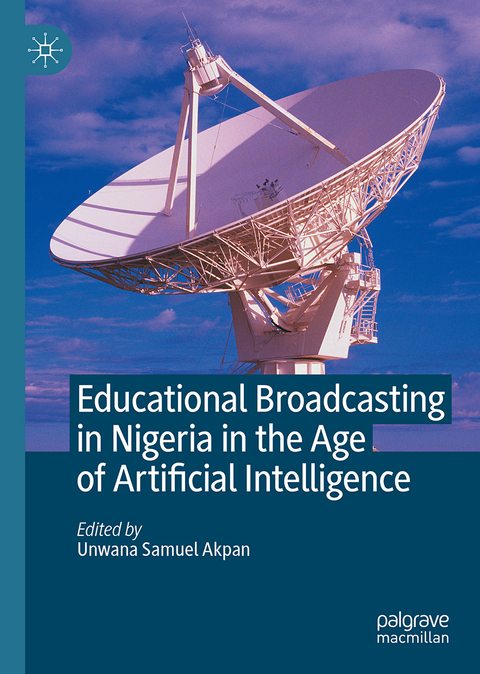
Educational Broadcasting in Nigeria in the Age of Artificial Intelligence
Springer International Publishing (Verlag)
978-3-031-68529-3 (ISBN)
This book does two things, first it celebrates and honors the research, scholarship, and leadership of Comfort Memfin Ekpo, the renowned Nigerian professor of educational technology, who is the second female vice chancellor to head a federal university in Nigeria. This book also explores the profound impact of digital interruptions and disruptions in the broadcast sector in Nigeria, exacerbated by the advent of artificial intelligence (AI). The book underscores the inadequacy of existing discourse to encompass the transformation of traditional educational broadcasting and programming. With Nigeria grappling with the highest number of out-of-school children globally, the book explores the urgent need to re-evaluate educational programs in the digital age, targeting marginalized populations hindered by factors such as electricity shortages and insufficient resources. The book, comprising contributions from senior scholars across Nigeria, aims to dissect the challenges and opportunities presented by AI and digitization in reshaping educational broadcasting. Unprecedented in its interdisciplinary approach, the book explores the intersections of communication, media, education, government policies, and the globalized landscape, offering a comprehensive analysis of the evolving dynamics in the field.
Dr. Unwana Samuel Akpan is a media scholar-practitioner with over two decades of broadcast and classroom experience with The Federal Radio Corporation of Nigeria, Radio-Nigeria, Lagos. He also taught at the National Broadcast Academy (The training arm of the Federal Radio Corporation of Nigeria, FRCN). Before joining University of Lagos as a lecturer in the Department of Mass Communication, he created, produced, and anchored programs that were sponsored while in Radio-Nigeria, Lagos, Nigeria. He is also the editor of University of Lagos Communication Review. He has been a Visiting Scholar at the Department of Communication, Culture and Media Studies (CCMS), where he completed his Postdoctoral Studies in the School of Communication and Media Studies, Howard University, Washington DC, USA.
Educational Broadcasting and Artificial Intelligence Challenges and Opportunities for Theory and Praxis in Nigeria.
.- Chapter 1. Artificial Intelligence AI Dynamics in Educational Broadcasting Research and Production in Nigeria: Riding the Wave or Drowning in the Looming Tsunami of Change?.
.- Chapter 2 How Symbiotic is the Union Between Artificial Intelligence and Educational Broadcasting?.
.- Chapter 3 Artificial Intelligence and the Transformation of Broadcasting: Implications for Nigerian Broadcast Professionals.
.- Chapter 4 Artificial Intelligence and Automated Educational Broadcasting in Nigeria A Futuristic Technesis for Today's Consideration
.- Chapter 5 Enhancing the Teaching and Learning of Educational Broadcasting Through Artificial Intelligence.
.- Chapter 6 Prospects and Challenges of Artificial Intelligence in Children's Radio Programmes in Rivers State, Nigeria.
.- Chapter 7 Challenges of Educational Broadcasting in a Digitized Age of Artificial Intelligence AI
.- Chapter 8 Potentials of Digitized and AI Enhanced Educational Broadcasting.
.- Chapter 9 Artificial Intelligence in Educational Broadcasting: Tool for Dissemination of Effective Pedagogy across Scholastic Levels in Nigeria.
.- Chapter 10 Leveraging on 4IR for an Effective Educational Broadcasting in Nigeria.
.- Chapter 11 Adapting Radio Broadcasting as a Tool Against Teachers Tendency for Resisting AI Technology.
.- Chapter 12 Artificial Intelligence AI Influence in Educational Media Broadcast in Individualized Instruction in The 21st Century.
.- Chapter 13 Promoting Educational Broadcasting in the Digital Era for Effective Teaching and Learning in Nigerian Schools.
.- Chapter 14 Artificial Intelligence and Educational Broadcasting: Digitizing Higher Education HE in Nigeria Context.
.- Chapter 15 Artificial Intelligence in Educational Technology: Panacea to Efficient Instructional Delivery.
.- Chapter 16 Artificial Intelligence Speechify App for Dyslexia on Students' Performance and Retention in Reading in Port Harcourt Metropolis, Rivers State, Nigeria.
.- Chapter 17 Modern Aspects of Communication for Pedagogic Knowledge and Skills Development in Human Kinetics, Sports and Health Education Students in Lagos State University, Lagos, Nigeria.
| Erscheinungsdatum | 05.10.2024 |
|---|---|
| Zusatzinfo | XXXVI, 260 p. 4 illus., 1 illus. in color. |
| Verlagsort | Cham |
| Sprache | englisch |
| Maße | 148 x 210 mm |
| Themenwelt | Informatik ► Theorie / Studium ► Künstliche Intelligenz / Robotik |
| Sozialwissenschaften ► Kommunikation / Medien ► Medienwissenschaft | |
| Schlagworte | Academic Gap • AI Effects • Artificial Intelligence • Challenges of digitized educational broadcasting • Communication • digital disruption • Education • Media Studies • Nigeria • Online educational programmes |
| ISBN-10 | 3-031-68529-6 / 3031685296 |
| ISBN-13 | 978-3-031-68529-3 / 9783031685293 |
| Zustand | Neuware |
| Informationen gemäß Produktsicherheitsverordnung (GPSR) | |
| Haben Sie eine Frage zum Produkt? |
aus dem Bereich


